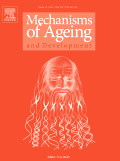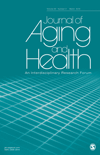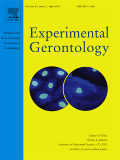
Frontiers in Aging
Scope & Guideline
Advancing the Science of Aging
Introduction
Aims and Scopes
- Biological Mechanisms of Aging:
Focus on the cellular and molecular mechanisms that contribute to aging, including studies on DNA damage, mitochondrial function, and cellular senescence. - Healthspan and Longevity Research:
Investigation into factors that promote healthspan and longevity, including nutrition, physical activity, and therapeutic interventions. - Psychosocial Aspects of Aging:
Exploration of the psychological and social dimensions of aging, including studies on loneliness, social support, and cognitive interventions. - Interventions and Therapies:
Research on various interventions aimed at improving the quality of life for older adults, such as pharmacological treatments, exercise programs, and digital health technologies. - Cross-Disciplinary Approaches:
Encouragement of interdisciplinary studies that bridge gaps between molecular biology, gerontology, nutrition, psychology, and public health.
Trending and Emerging
- Precision Medicine and Genomics:
An increasing focus on genomics and precision medicine approaches to understand individual variations in aging and responses to therapies. - Digital Health Innovations:
Emergence of studies on digital health technologies, telehealth, and smartphone applications aimed at improving health outcomes for older adults. - Impact of Lifestyle Interventions:
Growing interest in the effects of lifestyle interventions, including diet, exercise, and mental health strategies, on aging and healthspan. - Immunosenescence and Aging:
Expanding research on how aging affects immune function, particularly in the context of vaccination responses and infectious diseases. - Environmental and Social Determinants of Aging:
Increased emphasis on how environmental factors, socio-economic status, and community support systems influence aging outcomes.
Declining or Waning
- Traditional Gerontology:
Research that strictly adheres to traditional gerontological methods without integrating newer technologies or interdisciplinary approaches seems to be less frequent. - Longevity Myths and Non-Evidence-Based Claims:
Papers focusing on unsubstantiated claims regarding longevity without rigorous scientific backing have decreased, as the journal emphasizes evidence-based research. - Single-Domain Studies:
There is a noticeable decline in studies that focus solely on one aspect of aging (e.g., only biological or only psychological factors) without considering the interconnectedness of various dimensions. - Aging and Gender Differences:
While gender differences in aging remain an important topic, the frequency of studies focusing exclusively on gender disparities without a broader context has decreased. - Overemphasis on Age-Related Diseases:
Research solely focused on age-related diseases without considering preventative measures or holistic approaches to aging is becoming less prevalent.
Similar Journals

GERONTOLOGY
Bridging Disciplines in Gerontological StudiesGERONTOLOGY, published by KARGER in Switzerland, is a prominent journal dedicated to the study and understanding of aging, with a keen focus on the interdisciplinary aspects of geriatric medicine and gerontology. Established in 1957, it has provided a platform for cutting-edge research that covers a wide range of topics including, but not limited to, the biological, psychological, and sociological aspects of aging. With an impressive ranking that places it in the Q3 category for Aging and Q2 for Geriatrics and Gerontology as of 2023, the journal continues to attract high-quality submissions from researchers worldwide, evidenced by its Scopus rankings, which position it favorably within relevant fields. While it operates under a subscription model, the journal remains committed to advancing knowledge that informs practice and policy within an aging society. By fostering innovative studies and discussions, GERONTOLOGY serves as an essential resource for researchers, health professionals, and students alike, dedicated to the care and understanding of older adults.

MECHANISMS OF AGEING AND DEVELOPMENT
Exploring the Biological Foundations of AgingMECHANISMS OF AGEING AND DEVELOPMENT is a premier academic journal published by Elsevier Ireland Ltd, specializing in the fields of aging and developmental biology. With an impressive Q1 ranking in both categories as of 2023, this journal serves as a vital platform for researchers, professionals, and students seeking to advance their understanding of the complex biological processes that underlie aging and development. Since its inception in 1972, the journal has steadily contributed to the accumulation of valuable knowledge, maintaining a history of rigorous peer-reviewed articles that explore genetic, molecular, and cellular mechanisms impacting aging and development. Its high Scopus rankings—notably 5th in Aging and 8th in Developmental Biology—underscore its significance in the scientific community. While the journal follows a traditional publishing route without Open Access options, it remains an indispensable resource for those dedicated to the investigation of life’s aging processes and developmental phenomena. With publication projected through to 2024, the MECHANISMS OF AGEING AND DEVELOPMENT continues to shape the discourse within these critical research domains.

CELL
Connecting researchers with groundbreaking molecular insights.CELL is a premier academic journal in the field of Biochemistry, Genetics, and Molecular Biology, published by CELL PRESS. Founded in 1974, this esteemed journal has steadfastly contributed to advancing our understanding of cellular processes and organisms, making it integral for researchers and practitioners alike. With an impressive impact factor that places it in the Q1 category of its field, CELL ranks #1 out of 221 in general biochemistry and genetics, achieving a remarkable 99th percentile in Scopus rankings. Though it is not currently an open-access publication, the journal regularly disseminates high-quality research that impacts the scientific community significantly. Researchers, students, and professionals seeking to stay at the forefront of innovative discoveries and methodologies in molecular biology will find CELL an invaluable resource through its comprehensive articles and reviews.

Advances in Gerontology
Connecting Scholars to the Science of AgingAdvances in Gerontology is a pivotal academic journal dedicated to the field of gerontology, published by PLEIADES PUBLISHING INC. With its ISSN 2079-0570 and E-ISSN 2079-0589, this journal serves as an essential platform for researchers, healthcare professionals, and students focused on aging and related health issues. Although currently not an open-access journal, it aspires to enrich the scholarly community by disseminating high-quality research from 2011 through 2024. The journal is recognized in the lower quartile of its category, ranking Q4 in both Geriatrics and Gerontology, reflecting its commitment to addressing emerging topics in the aging population despite its lower visibility in the competitive landscape. As it continues to explore critical areas in gerontology, Advances in Gerontology invites contributions that advance knowledge, foster understanding, and inform practices within this essential field of study.

REJUVENATION RESEARCH
Transforming Aging through Interdisciplinary InsightsRejuvenation Research is a premier journal dedicated to the advancing field of gerontology and aging research, published by Mary Ann Liebert, Inc. Established in 2000, the journal serves as a pivotal platform for the dissemination of scholarly articles that explore the complex mechanisms of aging and innovative approaches to rejuvenation. With an impact factor reflective of its robust scholarly contributions, the journal currently holds a Q4 ranking in Aging and a Q3 ranking in Geriatrics and Gerontology, showcasing its relevance in the academic community. This periodic publication, welcoming open access submissions, invites researchers, professionals, and students alike to engage with cutting-edge findings that could shape future geriatric practices and enhance quality of life. The journal underscores the importance of interdisciplinary collaboration, encouraging explorations that intersect with biochemistry, genetics, and other vital areas of study. Through its ongoing commitment to high-quality research, Rejuvenation Research remains a critical resource for understanding the biological underpinnings of aging and the strategies to mitigate its effects.

Aging-US
Exploring the Frontiers of Aging and Cell BiologyAging-US is a premier peer-reviewed journal dedicated to advancing the field of aging research and cell biology. Published by IMPACT JOURNALS LLC, this journal serves as a vital resource for researchers and professionals exploring the biological mechanisms of aging and their implications for health and disease. With a commendable impact factor reflected in its 2023 Scopus rankings, where it stands at Rank #10/38 in the category of Aging and Rank #63/285 in Cell Biology, Aging-US exemplifies rigorous scientific excellence. Its open access policy enhances accessibility, fostering a wider dissemination of knowledge in both academic and clinical settings. Spanning from 2009 to 2024, the journal provides a platform for groundbreaking studies and innovative methodologies, ensuring that it remains at the forefront of the dynamic conversations surrounding aging and cellular biology. Engage with Aging-US to contribute to the evolving narratives of longevity and cellular health.

JOURNAL OF AGING AND HEALTH
Exploring the intersection of gerontology and well-being.The JOURNAL OF AGING AND HEALTH, published by SAGE PUBLICATIONS INC, is a preeminent peer-reviewed journal dedicated to advancing research in the field of gerontology and related disciplines. With an impressive impact factor and ranked Q1 across multiple categories including Community and Home Care, Geriatrics and Gerontology, and Health (Social Science), this journal has established itself as a vital resource for academics, clinicians, and policymakers alike. Spanning over three decades of publication from 1989 to 2024, it serves as a platform for innovative research and multifaceted discussions on aging, health, and the interplay of social factors influencing the elderly population. The journal's rigorous standards for publication ensure high-quality contributions that are impactful and relevant, making it an essential read for those dedicated to improving the health and quality of life for older adults. Although it is not an open-access journal, it provides comprehensive insights that are critical to understanding the complexities of aging in today's society.

EXPERIMENTAL GERONTOLOGY
Transforming Our Understanding of Aging Through Rigorous ScienceEXPERIMENTAL GERONTOLOGY is a prestigious journal published by PERGAMON-ELSEVIER SCIENCE LTD, dedicated to the evolving field of aging research. With a rich history dating back to 1964 and continuing through 2024, this journal aims to advance the understanding of the biological processes underlying aging and develop interdisciplinary approaches to improve healthspan. ENCOMPASSING a broad scope, including *biochemistry*, *cell biology*, *endocrinology*, *genetics*, and *molecular biology*, it holds impressive rankings in the 2023 Scopus Ranks, featuring in Q1 and Q2 quartiles across multiple categories. This positions it as a vital resource for researchers and professionals focused on gerontology and related fields. As a subscription-based journal without open access, EXPERIMENTAL GERONTOLOGY ensures the dissemination of high-quality research through rigorous peer review, making it an essential publication for those aspiring to remain at the forefront of aging studies.

npj Aging and Mechanisms of Disease
Unraveling the Secrets of Aging and Diseasenpj Aging and Mechanisms of Disease is a leading open-access journal dedicated to advancing the understanding of the biological mechanisms underlying aging and age-related diseases. Published by NATURE PORTFOLIO in the United Kingdom, this journal has established itself as a vital resource within the fields of Aging and Geriatrics and Gerontology, proudly holding a prestigious Q1 ranking in both categories as of 2023. With an impressive Scopus ranking, placing it in the top 10 for Geriatrics and Gerontology, and the top 9 for Aging, the journal is committed to disseminating high-quality, peer-reviewed research that offers innovative insights and fosters collaboration among researchers and practitioners. Since its inception in 2015, npj Aging and Mechanisms of Disease has embraced the open-access model, ensuring that groundbreaking findings are freely available to all, thereby promoting widespread knowledge-sharing within the scientific community. This journal serves as an essential platform for those seeking to explore the complex interplay of genetic, molecular, and environmental factors that influence aging and its associated challenges.

CEREBRAL CORTEX
Pioneering research in cognitive and molecular neuroscience.CEREBRAL CORTEX, published by Oxford University Press Inc, is a premier journal dedicated to advancing the field of neuroscience, specifically focusing on the cellular, molecular, and cognitive aspects of cortical structure and function. With an impressive impact factor that situates it in the top quartile (Q1) of its categories for 2023, this journal holds significant relevance for researchers and professionals interested in the latest discoveries and methodologies in both Cognitive Neuroscience (ranked #31 out of 115) and Cellular and Molecular Neuroscience (ranked #48 out of 97). Operating without an open access model, it ensures rigorous peer review and dissemination of high-quality research from across the globe. Since its inception in 1991, CEREBRAL CORTEX has established itself as a critical platform for educators and inventors, pushing the boundaries of knowledge in understanding brain function and its implications for behavior. Researchers and students alike will find this journal an invaluable resource for both foundational and cutting-edge studies in neuroscience.